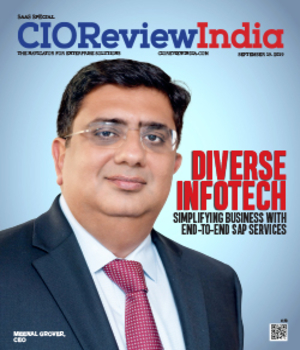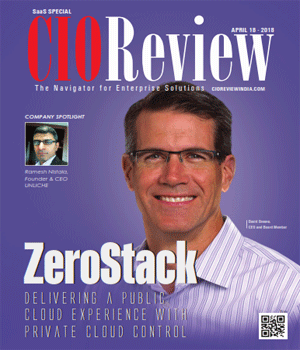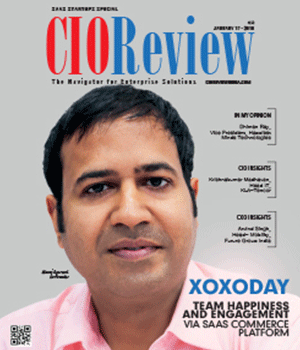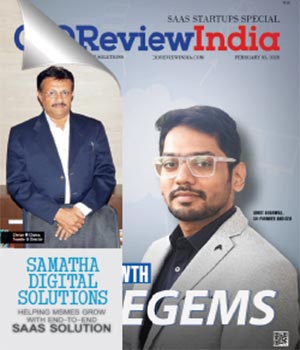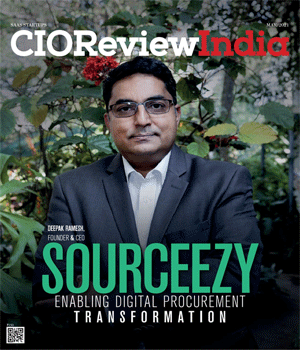
Four Questions To Answer Before Considering A Cloud Erp!
Shrikant Navelkar, Director, Clover Infotech

Specialized in business development, geography expansion and technology sales, he has helped the company to grow and establish market in different parts of the world.
The Cloud has ushered a transformational journey for enterprise applications. While the Cloud offers the obvious benefits of “as-aService” usage, it can offer much more for enterprise applications. Often termed as modernization, every enterprise application can enhance RoI and augment the value it provides by leveraging the Cloud.
An ERP application is no different. It enables the business users and technology teams to leverage the ERP Cloud providers for upgrades and for keeping the application “current”. The security of the ERP is taken care of by the Cloud vendors such as Oracle. Hence, the benefits of moving your ERP to the Cloud are immense. However, the decision is not as seamless as it may theoretically appear. Here’s a list of questions that you might want to consider before considering a Cloud ERP.
What Is The Compelling Need To Move On-Premises ERP Such As Oracle EBS To The Cloud?
An On-Premises ERP might be working perfectly fine for your business. It might be giving you the desired strategic insights and reports. However, if it is burdening the technology team in your organization with the constant customizations, integrations, report creation and building relevant analytics, and system upgrades, it could be a cause of concern. Moreover, if the bandwidth of the technology team is utilized in the above, it could lead to a delay in adoption of new-age technologies and digital initiatives. In today’s digital age, it could impact both revenues and brand building. Depending on the answer to the above, a Cloud ERP could be a good choice as it could ensure that it is the last migration, it can also ensure seamless integration with other modules or enterprise applications on-premises or on the cloud through secure and out-of-the-box integration. The decision to move to the cloud should be taken after gauging if the business is being impacted due to the on-premises ERP and if the bandwidth consumption of technology resources is such that it hinders innovation.
“A Cloud vendor must ensure that select and relevant modules can be procured on the Cloud. The vendor must also provide tools and the technology (PaaS) to seamlessly integrate with the onpremises ERP to ensure that the organizations can enjoy the best of both worlds”
Should I Just “Lift And Shift” To The Cloud Or Is There Another Way?
A “Lift and Shift” approach enables to move the onpremises ERP to the Cloud. In such a modernization exercise, the modules are moved as it is and subsequently, the business users run the ERP on the Cloud. Any further customizations, upgradations, integrations, etc. are managed post moving the ERP to the Cloud. The “Lift and Shift” strategy can be considered during three scenarios. The first one being when the existing IT infrastructure is approaching a hardware refresh. Second scenario is when the existing ERP application and the surrounding custom code has evolved to a large extent and you want to retain it as it is on the cloud. Lastly, “Lift and Shift” is a good option if you want to take a measured approach to cloud adoption by stabilizing the existing ERP on the Cloud for a year or two before considering a complete SaaS ERP implementation. “Lift and Shift” is best adopted by consulting a service provider with significant expertise and experience in having implemented this strategy for other organizations. This will enable your organization to avoid mistakes and enhance the probability of success of such a strategy.
If I Migrate My ERP To The Cloud, What Do I Do With My Existing Licenses?
Depending on the size of the organization and the number of business users accessing the Oracle ERP, the licenses could take a heavy toll on the organization in terms of cost. However, with the Cloud, the subscriptionmodel comes to such an organization’s relief. Before making such a move, it is critical to understand if the Cloud Providers such as Oracle, Microsoft etc. can optimize cost and provide value basis the already procured existing licenses with BYOL option. This cost optimization is crucial in empowering the organization to take the plunge towards adopting a Cloud ERP.
Should I Migrate The Entire On-Premises ERP To The Cloud Or Can I Retain It On-Premises And Integrate The Desired Modules From The Cloud?
A Cloud vendor must ensure that select and relevant modules can be procured on the Cloud. The vendor must also provide tools and the technology (PaaS) to seamlessly integrate with the on-premises ERP to ensure that the organizations can enjoy the best of both worlds. This hybrid deployment model can also enable organizations to make the ERP more robust by integrating the ERP with powerful Data Analytics systems, new-age technologies such as IoT, Blockchain etc. This will enable the deluge of data is channeled towards the ERP and the ERP can deliver cutting-edge business insights that empower the strategic and tactical management teams to take well-informed decisions.
Clover Infotech, a leading provider of IT services and an experienced expert in Oracle ERP Cloud has published a“6R model of ERP modernization” e-Book that can give more details about the above questions and address other ambiguities in this regard.
CIO Viewpoint
Upcoming Technological Advancements in Payments...
By Pinak Chakraborty, CIO of Airtel Payments Bank
Shaping the Future of AI: Talent, Innovation,...
By Yann LeCun, Chief AI Scientist at Meta
Future of Smart Manufacturing: Integrating Tech...
By Mohammed Kaishulla, Chief information officer, EPACK Durable
CXO Insights
The Rise Of Developer-LED Innovation And...
By Subrato Bandhu, Regional Vice President, OutSystems
Four Questions To Answer Before Considering A...
By Shrikant Navelkar, Director, Clover Infotech
3 Focus Areas For An Autonomous Driving Revolution



